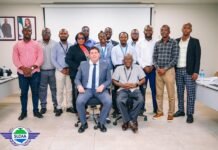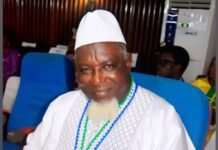By Amin Kef (Ranger)
During a media roundtable held at the U.S. Embassy in Freetown on Friday, October 4, 2024, U.S. Ambassador, Bryan David Hunt, outlined the Millennium Challenge Corporation’s (MCC) comprehensive strategy to drive Sierra Leone’s development, particularly in the energy sector. The event provided a platform for Ambassador Bryan David Hunt to engage with the media and shed light on the ongoing projects and the strategic importance of these initiatives for Sierra Leone’s future growth.
He underscored that the MCC has reached a pivotal juncture, with the Tripartite Commission’s final report already endorsed by Sierra Leone’s cabinet further announcing that the U.S Government is preparing to notify Congress of its intention to sign a compact that will unlock substantial funding for various developmental projects in Sierra Leone.
“We believe it is the right time to formally inform Congress,” Ambassador Bryan David Hunt stated. He emphasized the importance of transparency and accountability, explaining that members of Congress
will pose questions to ensure all aspects are clarified before disbursing funds. The Ambassador revealed that Congress is seeking three specific guarantees: continuous evaluation of Sierra Leone’s eligibility against MCC benchmarks, adherence to the “Ruling Justly” criteria and a robust U.S. engagement plan to support the implementation of national agreements.
A major point of discussion was the allocation of $7 million from the compact for monitoring and evaluation. Responding to a journalist’s query about potential delays caused by the tripartite implementation process, Ambassador Bryan David Hunt clarified that these funds were part of standard MCC procedures. He stressed the necessity of monitoring and evaluation to ensure that the $480 million compact is executed efficiently and safely.
The Ambassador also reassured media practitioners that the MCC’s five-year timeline will be strictly adhered to, with each project designed to deliver prompt and lasting results. He highlighted that the U.S. Government, alongside the MCC, would closely manage the funds to maintain transparency and ensure proper utilization, preventing the funds from being a “blank check.”
Another key element of the media roundtable centered around the “Ruling Justly” criterion. Ambassador Bryan David Hunt explained that it is designed to give Sierra Leonean political parties the space to develop and implement their solutions following the 2023 elections. He emphasized that the MCC’s role is to support local solutions rather than imposing external interventions, fostering an environment where Sierra Leoneans can take the lead in shaping their future.
On the legislative front, Ambassador Bryan David Hunt pointed out that Sierra Leone’s Parliament has already passed the necessary laws for the compact’s recognition. He highlighted key energy sector reforms, such as the introduction of a payment system for independent power producers, the development of a comprehensive sector reform roadmap and the initiation of private management for the Electricity Distribution and Supply Authority (EDSA). These reforms, he stated, are critical to ensuring the compact’s transformational impact on Sierra Leone’s energy infrastructure.
As part of the compact’s rollout, Ambassador Bryan David Hunt noted that infrastructure preparations could begin immediately, including pre-designs and feasibility studies. He stressed that the $480 million in funding would not simply be handed over to the Sierra Leonean Government but would be meticulously managed to ensure compliance with U.S. regulations.
Steven D. Grudda, the MCC Country Director, provided further insight into the compact’s energy sector focus. He underscored the importance of transparent financial management in sustaining public services like electricity. He elaborated on the MCC’s plan to engage top financial experts to advise the Sierra Leone Government on capacity building and financial management, ensuring that reforms are to be sustainable in the long term.
The MCC Country Director also highlighted initiatives aimed at enhancing electricity distribution and access, with a focus on reducing technical losses and expanding the national grid to reach more communities. He stressed the need for modernizing existing infrastructure while preventing system overloads, adding that the goal is to ensure reliable electricity for the majority of Sierra Leoneans.
In discussing success metrics, Steven D. Grudda explained that the MCC would use key indicators such as the number of electricity consumers and the quality of power distribution to measure progress. He emphasized that monitoring and evaluation would be conducted by external entities to ensure unbiased assessments of the compact’s impact.
As the media roundtable concluded, Ambassador Bryan David Hunt, reaffirmed the U.S. Government’s commitment to ongoing dialogue with the media and the public. He reiterated that the MCC’s funding would be rigorously monitored to ensure its effective use in driving Sierra Leone’s developmental goals, particularly in transforming the energy sector for long-term sustainability and progress.




